434: Meta's Threads vs Twitter, Crazy Porsche, US Energy Since 1776, Kevin Kelly, China Strikes Back, Norway, FBI, and AI Training AI
"how much new words are needed for what's happening"
No extraordinary journey is linear. In reality, the middle is extraordinarily volatile — a continuous sequence of ups and downs, flush with uncertainty and struggle.
–Scott Belsky
Sid Meier: “So many of our wildest dreams have turned out to be laughably conservative that it's hard to write off anything as impossible."🚀📈🔮🤔 The trajectory of anything that is on an exponential curve* is impossible to accurately imagine too long in advance.
This is because even a slight change in assumptions can lead to *wildly* different outcomes. How can you possibly get those assumptions perfectly right long in advance? Real life is too messy for that…
Compounding at 5% or 10% or 15% or 20% for twenty or thirty years leads you to *very* different places. Yet in the first few years, the difference doesn't seem that significant.
I don't mean just financially. The concept applies to many things.
*You’re smart so you will point out that there are few true exponential curves and that almost everything in the real world is an S-curve. That’s correct! But if an S-curve goes on for long enough, everything above still applies to it.
🏆📺🔍🙏 I have a favor to ask you today!
Please do it, it will only take two seconds:
Hit “Reply” to this email and send me the name of a TV show that you love and believe there's at least a 50% likelihood that I'm not yet familiar with it.
By this, I mean something that you haven’t seen me mention and think could be up my alley and isn’t super well-known (ie. not Breaking Bad or The Wire).
If you want extra credit on your homework, add a short description of why you like it.
Thank you! 💚 🥃
👦🏼🎮🧩 My five-year-old is playing ‘Portal’ on the Nintendo Switch.
He’s solving three-dimensional physics puzzles relatively easily, and he’s not particularly confused by the concepts.
It’s impressive to me. I think it’s because he’s been playing Minecraft for a couple of years and navigating 3d environments is second nature to him.
I can’t help but wonder if playing these kinds of games at a young age creates capabilities and skills that are much harder to acquire ‘natively’ when learned at a later age.
Kind of like how if you learn a second language very young, it’s more like you have two first languages, while if you learn later, you keep the accent and you’re never quite as fluid with it…
I wsa playing early FPS games like Doom when I was about 11, and I saw the adults around me struggle with the controls while they were easy for me. But what if I had started navigating 3D worlds when I was 3? 🤔
🇺🇸 If you’re American, I hope you had a 𝐇𝐚𝐩𝐩𝐲 𝟒𝐭𝐡 𝐨𝐟 𝐉𝐮𝐥𝐲! And if you’re not American, I still hope you had a happy 4th of July 😃
💚 🥃 🐇 I know you’ve been sitting on the fence for a while, meaning to support this project and check out the paid emails…. Today’s the day to do it!
Your support makes a big difference and fuels me to keep going. Thank you, your kindness is appreciated 🧡
🏦 💰 Liberty Capital 💳 💴
🐦🦅 Meta is launching its Twitter competitor on July 6 🥋
Zuck is going for the armbar:
Instagram’s rumored Twitter competitor just dropped on the iOS App Store in the U.S. The app will be called Threads, and according to App Store data, it’s expected to launch on July 6.
[Threads] directly ports over your Instagram followers and following lists. Instead of rebuilding a community from scratch, Threads users will already have their existing Instagram circles there from the get-go. [...]
Though Threads is closely connected with Instagram, it will be its own stand-alone app (Source)
In normal times, it’s very difficult to compete head-on with a social network by doing the same thing that they’re doing. The network effect is strong, people want to be where the interesting people and their friends are, etc.
But it’s not exactly normal times for Twitter these days, so we’ll see if 1) this is any good and 2) if it gets traction…
🇦🇹 🛞The (crazy) history of Porsche 🏭 🇩🇪
This is an excellent episode by friends-of-the-show David and Ben (💚 🥃) at Acquired, with special guest Doug DeMuro (if you’re a car person, you probably recognize that name):
There are many highlights, but a few that stand out to me are just how influential one person and one family were to the auto industry in Europe and the world! Remove just one piece from the board, and the whole game would have evolved very differently.
It’s also quite the inflection point when the family decides to step away from what was a family-run business after they had been doing so well for so long (though at the cost of family friction, which is a big deal and shouldn’t be underrated — there’s more to life than business). Once the professional managers stepped in, things went off the rails in so many ways…
🇺🇸 Energy consumption in the US since 1776 🔥🛢️🔌⚛️🏭🪨
To celebrate the 4th of July, here is the evolution of the energy picture in the US since the country was formed:
As you can see in the top graph, various sources have had their heyday and then declined in importance.
However, the graph at the bottom shows that the absolute growth in energy consumption means that even sources that declined a lot in relative terms are still pretty big and that new entrants tend to be additive rather than fully displace the old sources.
🗣️ Interview: Kevin Kelly 📸
Kelly can find interesting and insightful things to say about any topic, which is why I enjoy listening to him so much (and I enjoyed talking to him a lot too! 🎧).
Patrick O’Shaughnessy (🍀) recently had a great convo with him, I recommend it:
Here’s a highlight on how to identify interesting areas where things are happening:
If you encounter some subculture or some little niche or some new technology or some research area, there is maybe one person working on it, and every year or so, maybe they discover something, and it's like, okay, it's not enough.
But if there's a bunch of people and every week, they're coming with another something, that says that there's certain momentum or acceleration that's involved. There's a sense of, well, there's enough being discovered that we could kind of imagine this scaling up into something bigger. And so you're looking at the recent past to see what's the rate of new things.
And then another metric that I use is how much new language and words are needed for what's happening. You want a true area like this will be ahead of language and having to create new terms, new words, new things.
I also liked his take on “productivity”, which ties into the concept of “journey vs destination” that I keep coming back to:
there is a kind of a misappreciation or misunderstanding about productivity, which is that a lot of people who are productivity-focused will be trying to minimize the amount of time they spend on working on something.
But actually, what you really want to be doing is you want to be finding things that you want to spend as much time as possible working on. That's this idea, like the reward for work is more work, is you want to be doing something where the goal is to spend more time doing it.
Yes, productivity is fine. But what you're trying to do is actually move your time so that you are trying to spend as much time doing it and trying to find those kinds of tasks and those kinds of assignments and those kinds of jobs where you would almost pay to do it.
I also liked his views on startups vs big companies when it comes to innovation, but I’m running out of space, so you’ll have to listen for that one!
🥊 🇨🇳 ‘China strikes back with export curbs on gallium, germanium used for chipmaking’
Gallium and germanium, along with their chemical compounds, will be subject to export controls meant to protect Chinese national security starting Aug. 1 [...]
Exporters for the two metals will need to apply for licenses from the commerce ministry if they want to start or continue to ship them out of the country, and will be required to report details of the overseas buyers and their applications, it said. [...]
China is the dominant global producer of both metals that have applications for electric vehicle makers, the defense industry and displays. Gallium and germanium play a role in producing a number of compound semiconductors, which combine multiple elements to improve transmission speed and efficiency. China accounts for about 94% of the world’s gallium production
What kind of impact will this have?
Impact on the tech industry “depends on the stockpile of equipment on hand,” said Roger Entner, an analyst with Recon Analytics LLC. “It’s more of a muscle flexing for the next year or so. If it drags on, prices will go up.”
The good news is that these aren’t rare metals, it’s mostly that China as the low-cost producer has made it unnecessary to develop production elsewhere. If this lasts a while, maybe it’ll help diversify supply and turn out to be a good thing.
🇩🇪🏭 Germany exports almost as many goods as the US
The Netherlands is really punching above its weight!
The 1929 Crash: Down the elevator and then falling down the stairs…
Looking at this line, I’m trying to follow it with my eyes very slowly and imagine myself living through it as the years pass one after the other… Quite the ride!
🧪🔬 Liberty Labs 🧬 🔭
👩🏫🤖When AI is trained by AI (even when you think it’s human data)
One of the interesting phenomena that we’re starting to see, and will likely see more in the future, is that large models will be increasingly trained on data that includes AI-generated data.
For example, this article talks about how AI labs are using freelance marketplaces to hire tons and tons of gig workers to do labor-intensive tasks like labeling images or text or rating the quality of output or whatever.
But now that AI tools are easily available, these workers are using them to do their work, so the signal is not purely from humans anymore.
There’s also the vast corpus of data scraped across the web that serves as the foundation for these models (along with private datasets). The web will contain an increasing amount of text and images generated by AI (and ever more audio and video too) and it may not always be easy to tell which is which.
This is not necessarily *all* bad.
A lot of text and images generated by AI get rated quite highly by humans. It’s almost like a genetic algorithm where the most aesthetically pleasing and most interesting images make the cut, so including them in the training data doesn’t necessarily make it “weaker” or dilute it, but it does change its nature.
I’m more worried about the flood of low-quality garbage/spam, which will easily outnumber the carefully curated stuff by many orders of magnitude.
I’ll be very curious to see how the AI community deals with this, and whether pre-2022 archives will be considered special in some way and the data after that point will be more suspect 🤔
🇳🇴🧑🌾 Norway finds gigantic phosphate deposit, doubling the world’s known reserves 🥕🌾🚜
That’s not as sexy a headline as something having to do with TSMC or ASML or Nvidia, but it’s important stuff:
A massive underground deposit of high-grade phosphate rock in Norway, pitched as the world’s largest, is big enough to satisfy world demand for fertilisers, solar panels and electric car batteries over the next 100 years [...]
About 90% of the world’s mined phosphate rock is used in agriculture for the production of phosphorous for the fertiliser industry, for which there is currently no substitute.
If you like food, this is good news!
Phosphate rock is an essential element used in the production of phosphorous for the fertiliser industry and was included in the European Commission’s March proposal for a Critical Raw Materials Act.
The Norwegian deposit is estimated to be worth 70 billion tonnes at least, which is just under the 71 billion tonnes of proven world reserves as evaluated by the US Geological Survey in 2021.
By far the largest phosphate rock deposits in the world – around 50 billion tonnes – are situated in the Western Sahara region of Morocco. The next biggest are located in China (3.2 billion tonnes), Egypt (2.8 billion tonnes), and Algeria (2.2bn tonnes), according to US estimates.
📞 ‘FBI finally tracks “swatting” incidents as attacks increase nationwide’ 🚔👮🏻♂️
I wrote a bit about ‘swatting’ back in Edition #368 (people hacking connected doorbells):
In one instance, a hoax call was made to police in West Covina, California, with the caller pretending to be a minor reporting her parents were drinking and shooting guns in the home. Nelson allegedly accessed the Ring camera and used it to taunt and threaten the responding police officers, prosecutors said.
It’s an incredibly disturbing and often fatal crime, and it looks like the FBI is finally getting a bit more organized about it:
Last month, the FBI created a national online database to finally start coordinating law enforcement reports about "swatting" attacks nationwide [...]
the database will help combat the growing swatting problem by facilitating "information sharing between hundreds of police departments and law enforcement agencies across the country pertaining to swatting incidents."
On college campuses, swatting is notably increasing. Nine campuses across the US were targeted by swatting attacks in a single week in April, NBC News reported. [...]
Swatting has become so common, Berghel wrote, that several subclasses have already been defined, including celebrity swatting, gamer swatting, partisan swatting (directed against politicians), and hate swatting.
🎨 🎭 Liberty Studio 👩🎨 🎥
🔊🎶 Average loudness by genre, based on analyzing 1 million Spotify tracks
This is why it’s so hard to have a single playlist that includes both metal and classical 😬




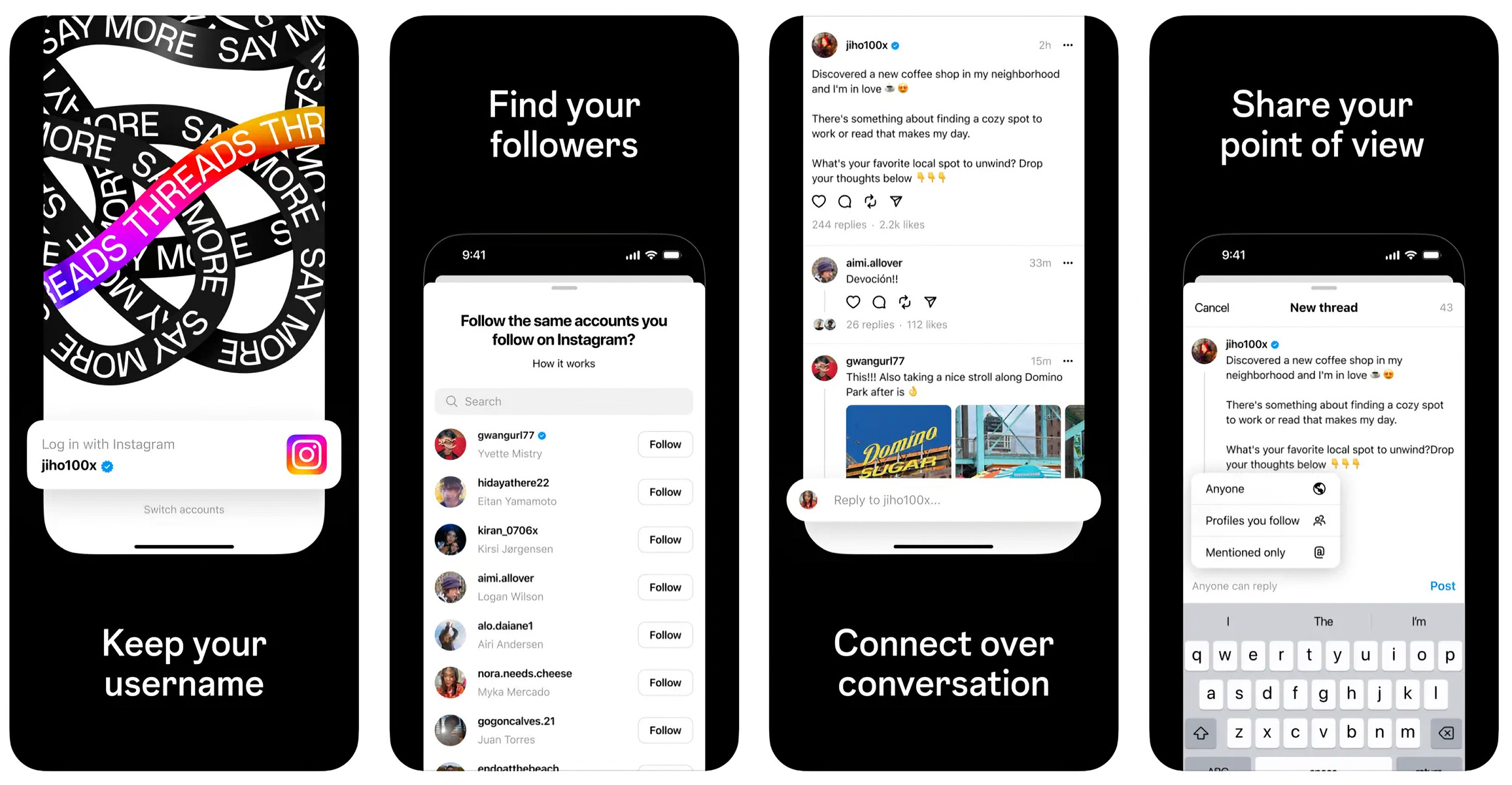
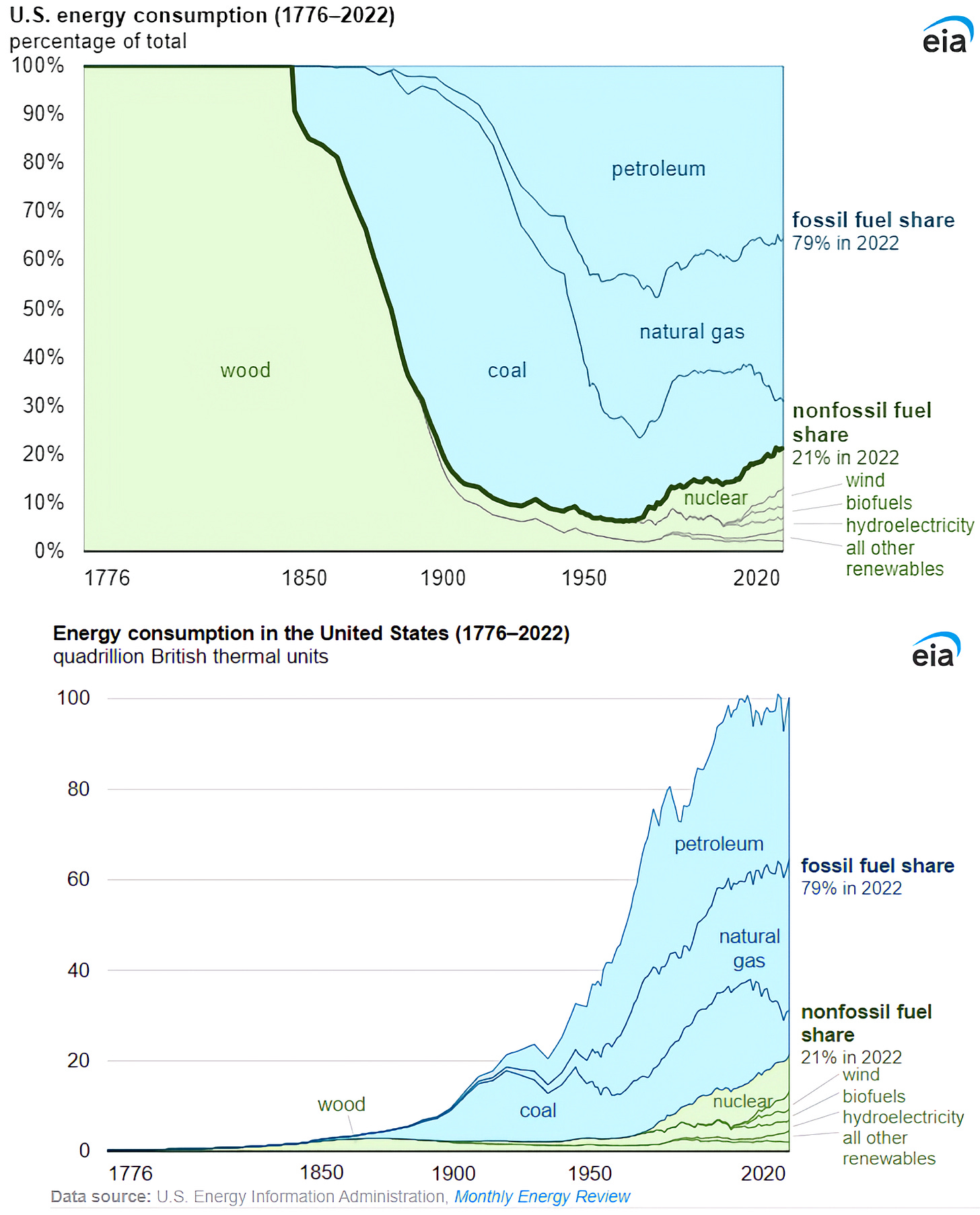
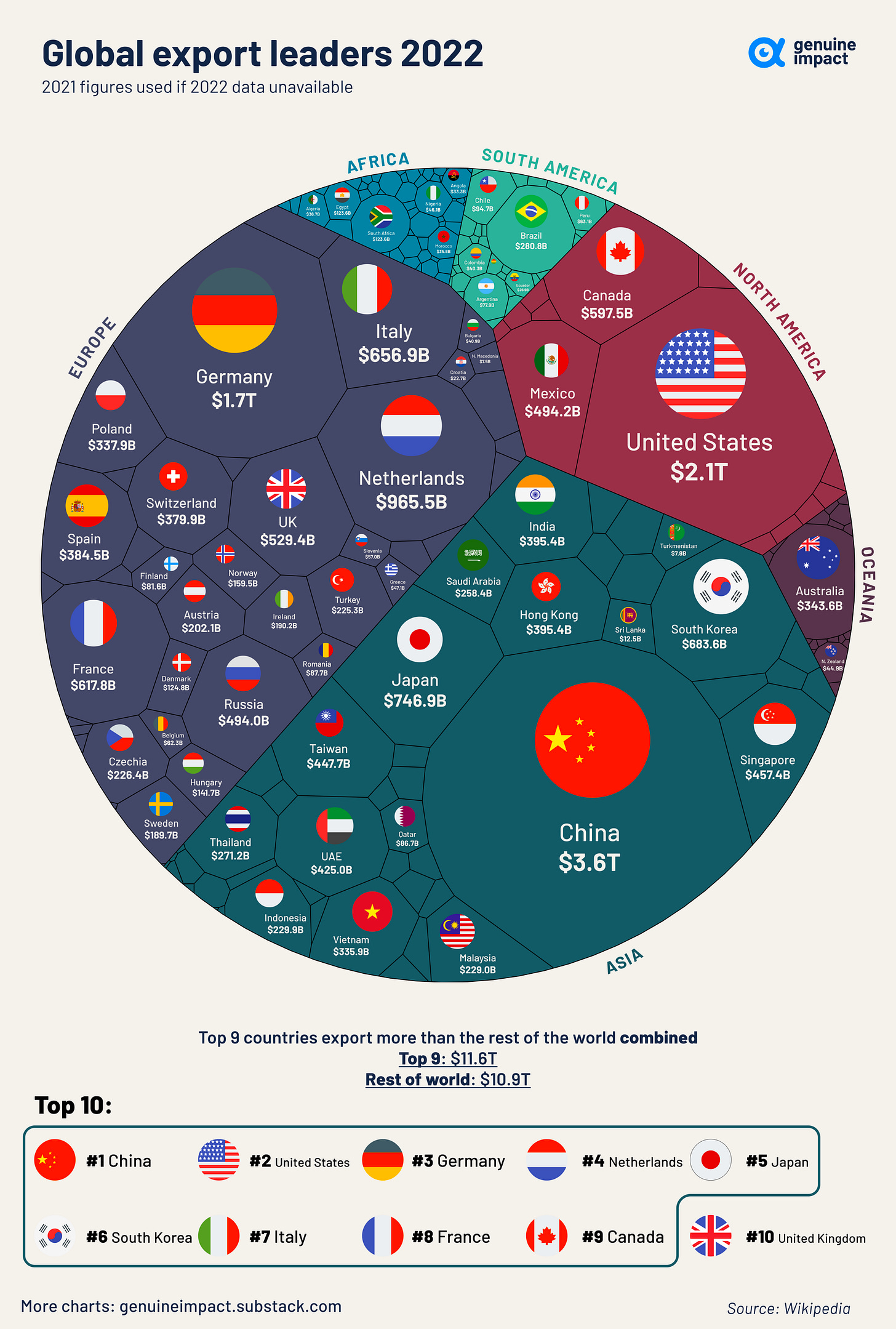
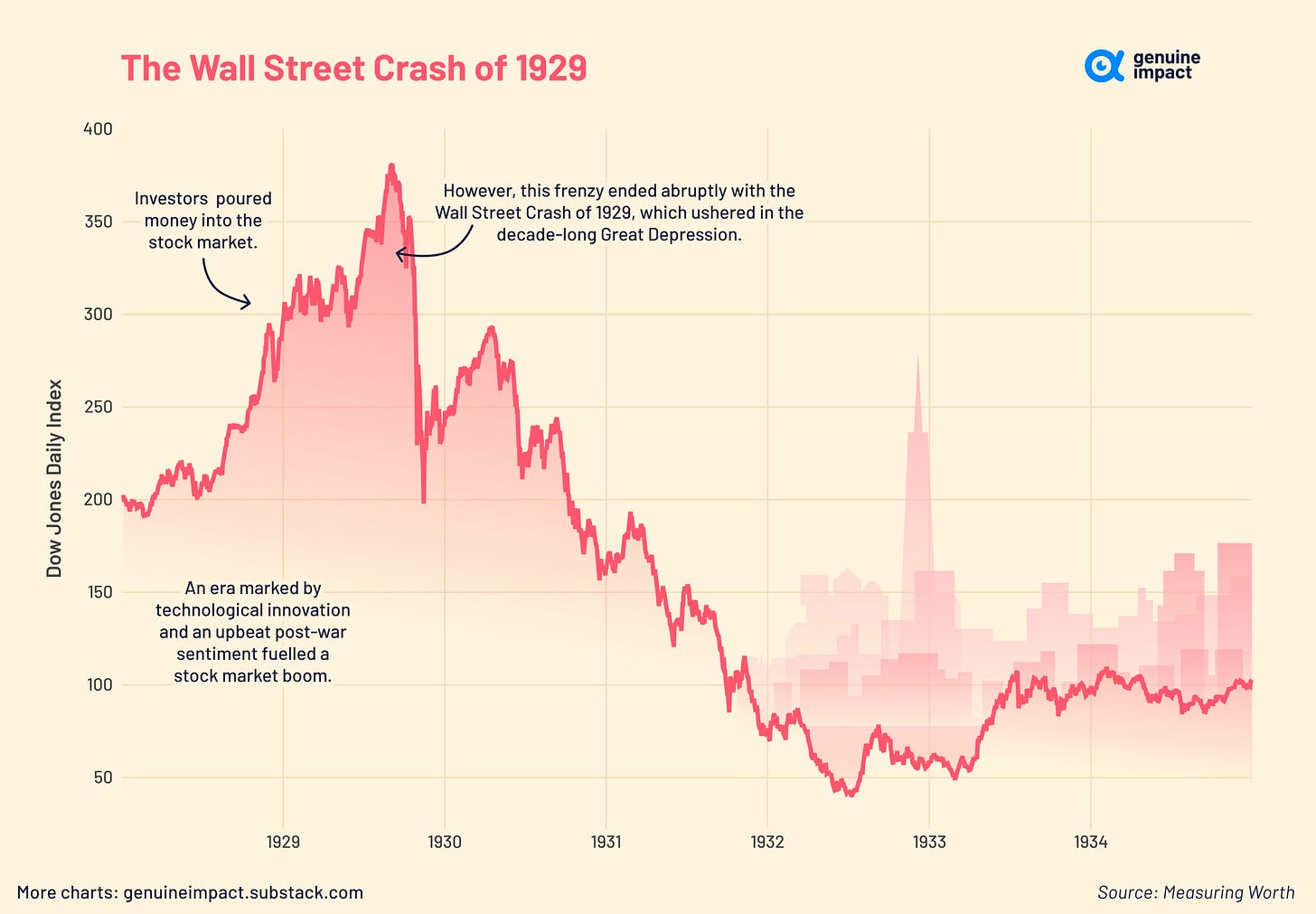

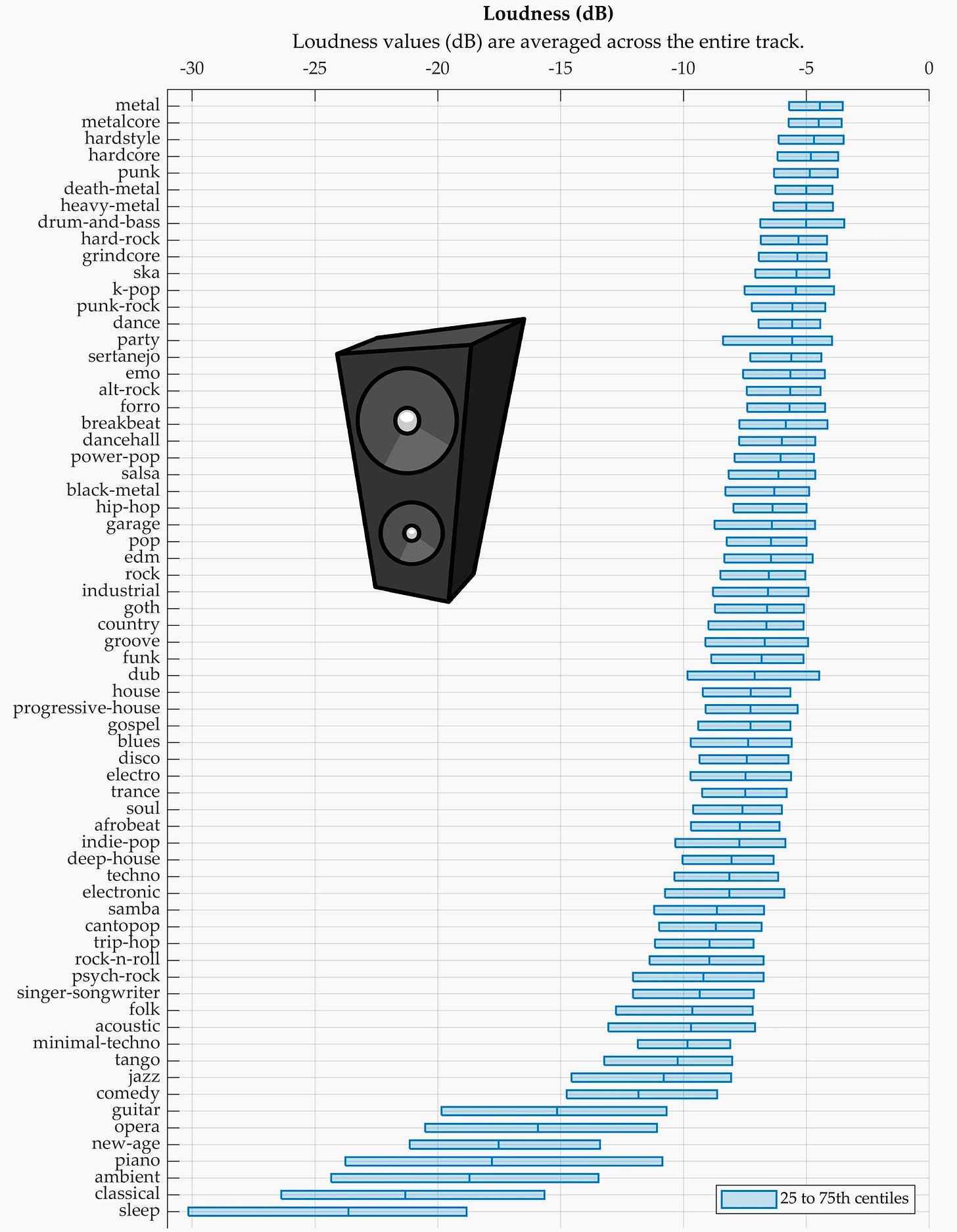
> pre-2022 archives will be considered special in some way and the data after that point will be more suspect
Like low-background metal pre July 16, 1945 (https://qz.com/emails/quartz-obsession/1849564217/low-background-metal-pure-unadulterated-treasure)...
As always, a fun and informative read. Thanks!